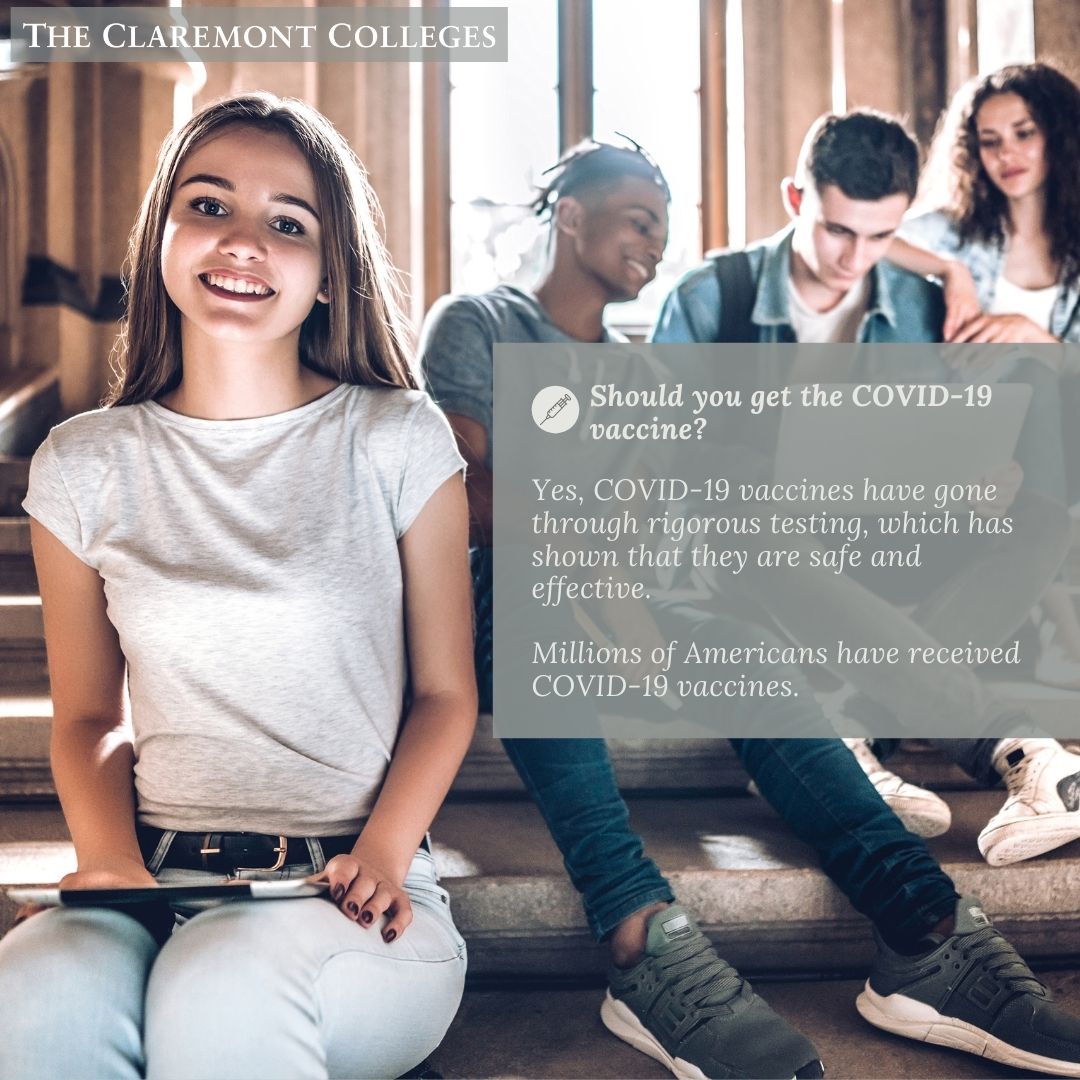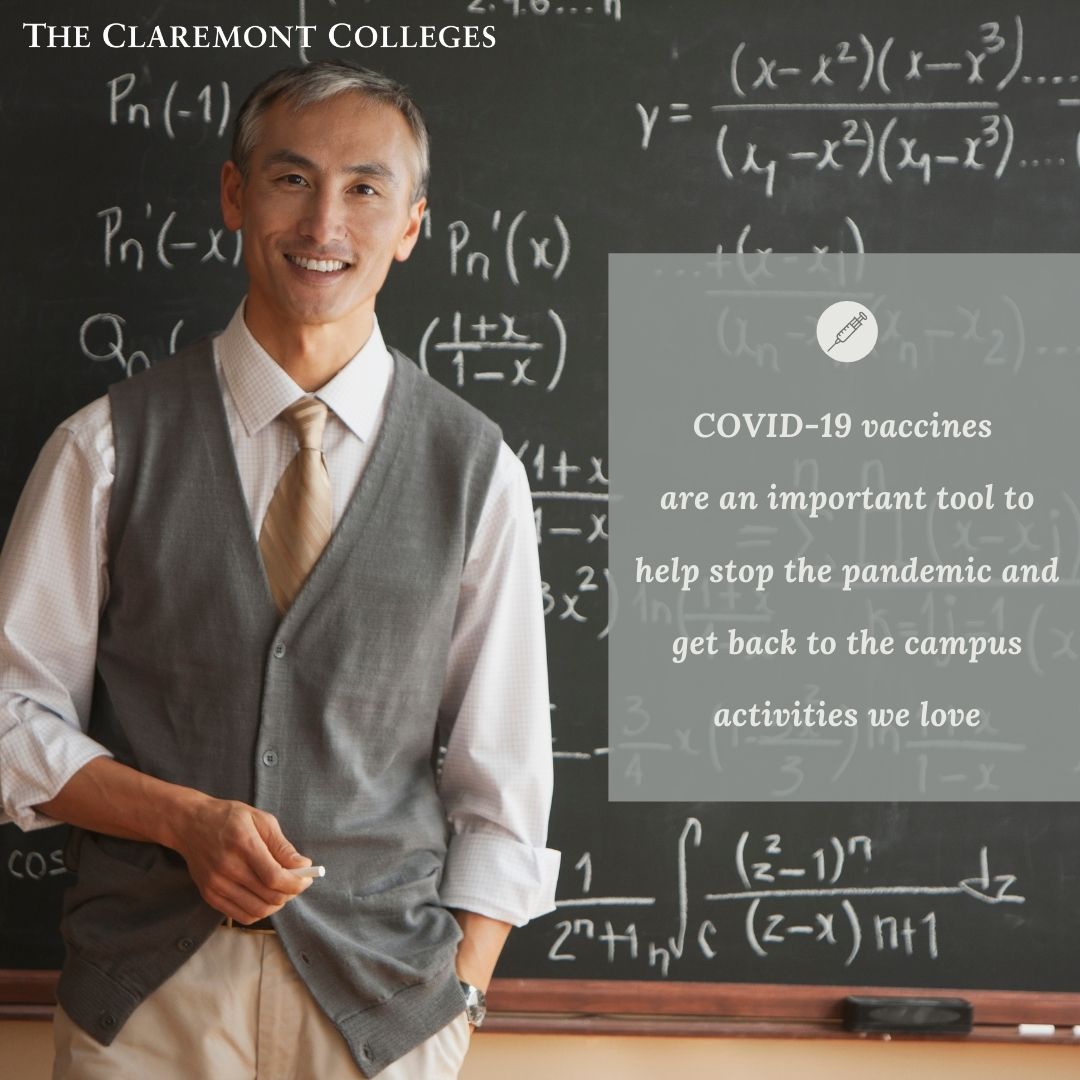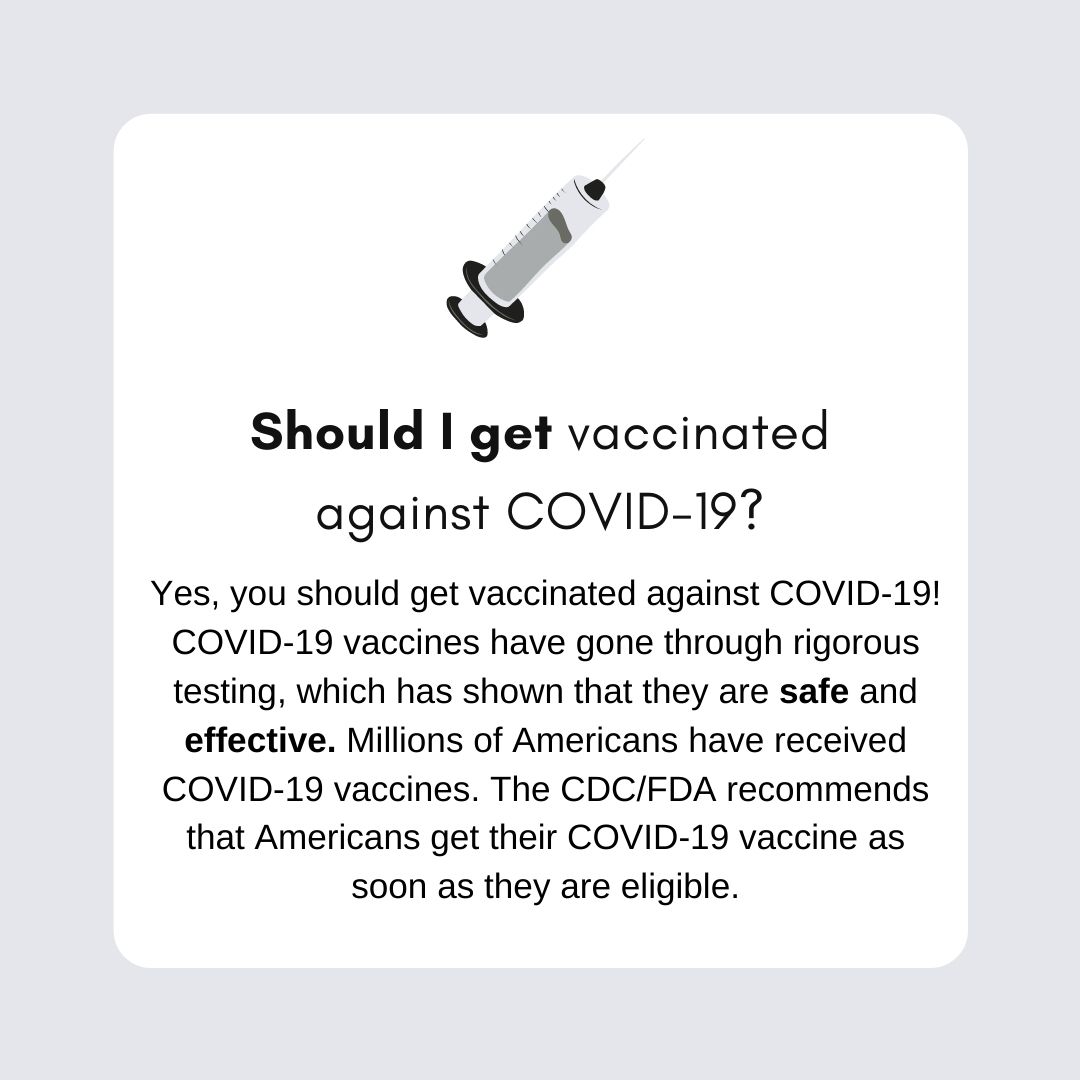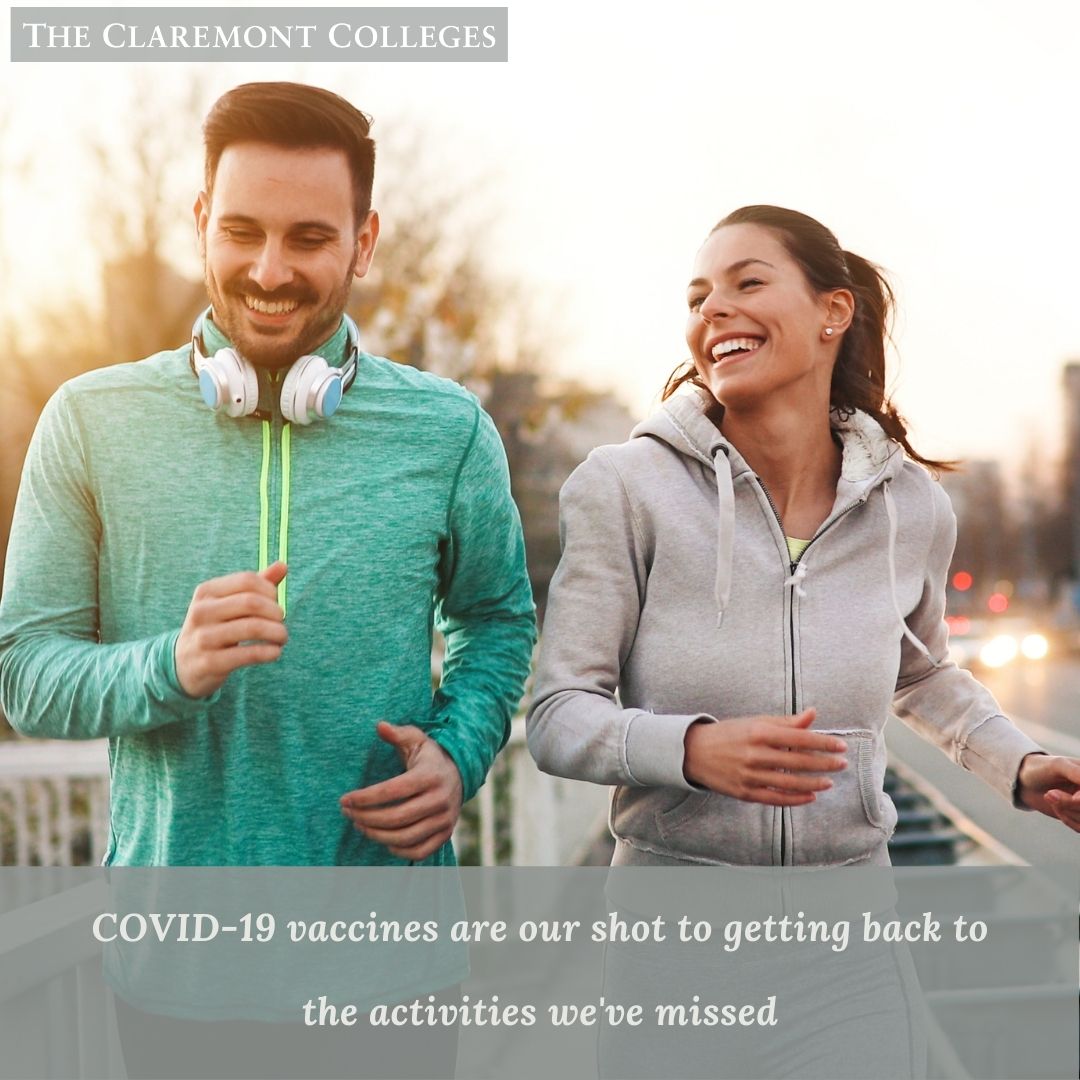COVID-19 News & Resources
Campus COVID-19 Websites
Latest News
Fall 2022 Update
Dear 7C students,
The beginning of another academic year is now upon us. Omicron variants and subvariants continue to cause COVID-19 infections across the world. However, our knowledge in the prevention and treatment of this disease continues to expand and thankfully, the burden of this disease in terms of severe illness, hospitalization, and death continues to diminish. Those who have kept “up to date” on their COVID-19 vaccinations, including all recommended boosters when eligible, continue to fare significantly better than those who are not up to date. With this is mind, our campuses continue to require students to remain up to date on their vaccinations, so we can all safely return to campus for an excellent, in-person higher education experience.
This semester, students will notice some changes related to COVID-19 testing.
- While there may be some periodic mandatory testing (please refer to your campus for their specific requirements), for the most part, testing will simply be easily available to students who wish to test. Whether you have symptoms, you were exposed, or you just want to know your status, you can get tested.
- The location of your testing may have also changed since last year. All students will now utilize the saliva PCR testing option offered through Student Health Services (SHS). No more nose swabs, for those who were still having to go through that last year.
- Another exciting change you will notice is the placement of vending machines spread across the consortium. The vending machines are just now arriving on campus and should be operational shortly. Then, students will be able to test at their convenience rather than having to rush to a testing site before it closes. More information about this option will be shared as soon as it becomes operational.
In LA County, an individual testing positive for COVID-19 is still required to isolate for a full 10 days. Neither LA County nor the State of California have changed this policy in this regard, despite change in CDC guidance earlier in the year. However, the early test out option using an antigen test continues to remain in place and we will continue to offer this option on campus.
Indoor masking continues to be strongly recommended, though not required, on most parts of the campus. Please note that healthcare facilities such as SHS and Monsour Counseling and Psychological Services (MCAPS) are still required to enforce mandatory indoor masking. I would encourage everyone to wear a well-fitting, high-grade mask any time they are indoors, except when sleeping or actively eating/drinking. I would ask you to keep in mind that besides vaccinations, masking is one of the most effective ways to reduce your risk of catching respiratory infections such as COVID-19.
Monkeypox is now also at the forefront of many people’s minds. We recently received an update from LA County Department of Public Health, and they have provided us reassurance that it is safe for us to bring students back to campus. There are a few additional things I wanted to mention regarding Monkeypox:
- Based on their experience so far, LA County Department of Public Health informs us that transmission of monkeypox has occurred almost exclusively in situations involving close personal, skin-on-skin exposure, often during sexual activity where such exposure can be expected.
- The risk of transmission from casual interactions such as sharing the same space as an infected individual or from a brief handshake are almost negligible, according to their expert guidance.
- If you have a rash which is of concern for monkeypox, please know that you will be able to make an appointment to see a provider at SHS and if determined to be necessary, the provider will have an ability to collect appropriate specimens to send to the laboratory for testing.
- LA County Department of Public Health has reassured us that at this time, there will be no requirement to move an individual with Monkeypox into a separate isolation space.
- The isolation which will be required will be contact isolation, meaning you should isolate any rash/skin lesions from others with the use of clothing or bandages which adequately cover these skin lesions.
- SHS will continue to monitor the situation closely and we will provide updates to the campus community should our knowledge and guidance regarding monkeypox change.
- SHS has also established a Monkeypox webpage with some current facts. We will make updates there as well when new information becomes available.
So, while there continue to exist many things for us to be mindful of, please know that SHS will continue to provide appropriate guidance with the health, well-being and safety of our students and community at the forefront of everything we do.
Please feel free to reach out to a SHS provider, MCAPS counselor or utilize the no-cost 24/7, on-demand telehealth service (7C.Health) if you have any questions or concerns regarding your physical or mental health at any time. We look forwarding to welcoming you back for a safe and successful year ahead.
Regards,
Prateek Jindal, DO
Assistant Vice President for Health and Wellness
Guidance & Testing
Students
If you are not feeling well, please contact your regular healthcare provider or call Student Health Services at (909) 621-8222 for guidance.
For health emergencies, call 911 or campus safety at (909) 607-2000 or (909) 607-7233.
Faculty & Staff
If you are not feeling well, please contact your healthcare provider.
For health emergencies, call 911 or campus safety at (909) 607-2000 or (909) 607-7233.
How can I help prevent illness?
Prevention measures are similar to those utilized against the common cold and flu.
Get a flu shot. Undergraduate students are required to have a seasonal influenza vaccine and provide proof of vaccination.
While it will not prevent COVID-19, initial flu symptoms can be similar to COVID-19. Contact Student Health Services at 909-621-8222 to schedule an appointment.
- Wash your hands often with soap and water for at least 20 seconds. If soap and water are not available, use an alcohol-based hand sanitizer.
- Avoid touching your eyes, nose, and mouth with unwashed hands.
- Don’t share food and drinks.
- Clean and disinfect shared surfaces and objects that are touched frequently (e.g. door knobs, desks, phones).
- If you can, avoid close contact with anyone with cold or flu-like symptoms.
I am feeling stressed and overwhelmed, who can I talk to?
Monsour Counseling and Psychological Services (MCAPS) is dedicated to TCC student emotional health and can be reached 24/7 at 909-621-8202. MCAPS also offers tele-therapy for students living in California.
Students can also reach out to 7C.Health for 24/7 on-demand telemedicine counseling visits.
Employees should reach out to their primary care providers and/or mental health providers.
Employees can also reach out to their Human Resources departments to see if they qualify for any counseling sessions under an Employee Assistance Program (EAP).
Employees (7Cs/TCCS) – Contact your Human Resources team for testing resources.
Undergraduate Students (5Cs) – COVID tests are now available through SHS Lab Visits. Schedule your Lab Visit through My Health Portal or call SHS at 909-621-8222.
COVID tests are also available at Campus Safety, which operates 24/7, offering a convenient after-hours service.
Campus Safety
101 South Mills Avenue
Claremont, CA, 91711
Graduate Students (CGU/KGI)
CGU – Resources are noted on the Dean of Students website under Health, Wellness and Emergency.
KGI – Contact the KGI Student Affairs at student_services@kgi.edu for testing resources.
| Undergraduate Students (5Cs)
Beginning in the spring semester of 2024, rapid antigen tests are now accessible through an Student Health Services (SHS) Lab Visit. Schedule a Lab Visit via My Health Portal or call SHS at 909-621-8222. Results will be posted to your My Health Portal within an hour after your visit. Appointments are required; walk-ins will be accommodated in open appointment times as available. COVID tests are also available at Campus Safety, which operates 24/7, offering a convenient after-hours service. Please be advised that the COVID test kit vending machines, previously stationed, are no longer available. All undergraduate students at The Claremont Colleges can receive COVID tests for free at Student Health Services and Campus Safety. Graduate Students (CGU/KGI) CGU – Resources are noted on the Dean of Students website under Health, Wellness and Emergency. KGI – Contact the KGI Student Affairs at student_services@kgi.edu for testing resources. |
Results will be posted to your My Health Portal within an hour after your lab visit. Appointments are required; walk-ins will be accommodated in open appointment times as available.
LACPDH has updated its isolation requirements as follows:
- If asymptomatic, no isolation required – must still wear mask for 10 days when around others
- If symptomatic, isolate only until there is no fever for 24 hours without the use of fever-reducing medicines and symptoms are mild/improving (i.e., no more minimum 5 day isolation period) – must still wear mask for 10 days when around others regardless of how early you leave isolation
COVID-19 FAQs
Many viruses frequently change through mutation. These mutations add up and create slightly different versions of the virus, called “variants.” Sometimes new variants appear and then disappear. Other times, new variants stay around. They are called variants of concern if there is evidence that they spread more easily, cause more serious illness, are harder to detect, treat or prevent with vaccines. Scientists continue to study and track these variants as they evolve.
Many variants of COVID-19 have emerged in the United States. At this point, the original version of the virus that was spreading in January 2020 is no longer circulating.
On-campus call Campus Safety at 909-607-2000 (x72000)
Off-campus call 911 immediately
Yes, this is correct. Effective March 13, 2023, Los Angeles County Department of Public Health no longer requires proof of a negative viral test to leave isolation. As long as your symptoms are mild and improving, and you haven’t had a fever for at least 24 hours without the use of fever-reducing medicines, contact tracing should be able to release you from isolation after speaking with you on Day 6. However, you will still be required to wear a well-fitting mask over your mouth and nose when around others, especially indoors, even after your isolation ends, until Day 11.
You can receive at-home antigen tests through:
- Your insurance company (most insurances are required to cover the costs of up to 8 at-home antigen tests per month)
- https://www.covid.gov/tests – you may be eligible to receive a limited quantity of test kits directly from the federal government, delivered by the United States Postal Service
- Purchase from pharmacies (e.g. Hendricks, CVS, Walgreens), other retailers (e.g., Walmart and Target), or online (e.g., Amazon)
SHS does not distribute any at-home antigen test kits. However, antigen testing may be performed for students during a visit with a SHS provider if they suspect their symptoms may be due to COVID-19.
TCC supports the personal choice to wear a mask as an effective strategy for individuals seeking to protect themselves and their colleagues from COVID-19. We encourage anyone who wishes to wear a mask to do so and will continue to have KN95 masks available for pickup around campuses.
We recognize that some people may not be ready to stop wearing masks while others are eager to do so. Please continue to be compassionate and respectful of personal decisions regarding masking that fall within TCC’s regulations. Masks remain required in SHS and MCAPS.
State COVID Information:
L.A. County Department of Public Health COVID-19 site
The Claremont Colleges COVID Pages:
Handwashing is one of the best ways to protect yourself and your family from getting sick. Wash your hands often with soap and water for at least 20 seconds, especially after blowing your nose, coughing, or sneezing; going to the bathroom; and before eating or preparing food. If soap and water are not readily available, use an alcohol-based hand sanitizer with at least 60% alcohol.
COVID-19 can be spread by people who do not have symptoms and do not know that they are infected. Wearing face masks provide proven protection against the spread of illness as masks provide an extra layer to help prevent the respiratory droplets from traveling in the air and onto other people.
People with COVID-19 have had a wide range of symptoms reported – ranging from mild symptoms to severe illness. Symptoms may appear 2-14 days after exposure to the virus. People with these symptoms may have COVID-19:
- Fever or chills
- Cough
- Shortness of breath or difficulty breathing
- Fatigue
- Muscle or body aches
- Headache
- New loss of taste or smell
- Sore throat
- Congestion or runny nose
- Nausea or vomiting
- Diarrhea
Please note that this list does not include all possible COVID-19 symptoms.
Some of the emergency warning signs* for COVID-19 are listed below. If someone is showing any of these signs, they should seek emergency medical care immediately
- Trouble breathing
- Persistent pain or pressure in the chest
- New confusion
- Inability to wake or stay awake
- Bluish lips or face
*This list is not inclusive of all the possible emergency symptoms. Please call your medical provider for any other symptoms that are severe or concerning to you.
The Claremont Colleges consortial COVID-19 website was last updated in January 2024.
 (909) 621-8000
(909) 621-8000







